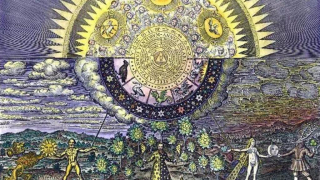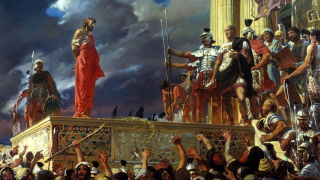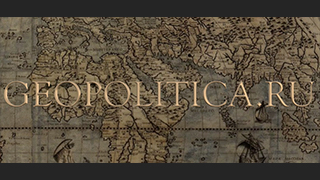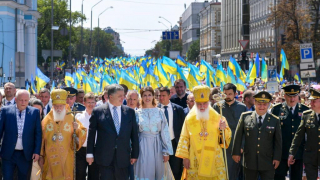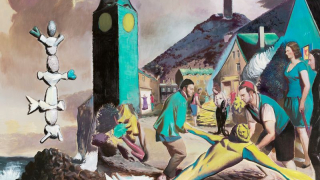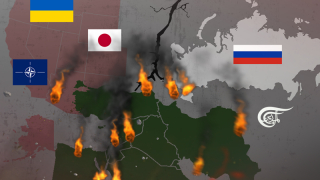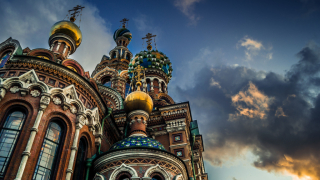The Self-Defeating Tradition of the Post-Schism West
20.07.2017
Since the so-called Age of Enlightenment, for Western Europe and her colonial offspring, the history of the world centers around individual freedom, either getting it or losing it.
In the context of the [u]nited States, this vision usually begins with Magna Carta and ends with the pinnacle (so say some) of all human political development, the u. S. Constitution of 1787:
I doubt too whether any other convention we can obtain may be able to make a better Constitution. For when you assemble a number of men to have the advantage of their joint wisdom, you inevitably assemble with those men, all their prejudices, their passions, their errors of opinion, their local interests, and their selfish views. From such an Assembly can a perfect production be expected? It therefore astonishes me, Sir, to find this system approaching so near to perfection as it does; and I think it will astonish our enemies. . . . Thus I consent, Sir, to this Constitution because I expect no better, and because I am not sure, that it is not the best.
(Benjamin Franklin, quoted by Matthew Spalding, http://www.heritage.org/the-constitution/report/the-formation-the-constitution)
There is a major problem with this vision and goal of history: Just as the goal is achieved, just as the individuals are hermetically sealed inside their impervious spheres of self-government, just then does defeat come upon their project of perfecting the political order. For individuals concerned primarily with their own rights and freedoms cannot love. They can only be afraid - of someone imposing limitations on them, of someone taking their freedom. Self-love is their underlying motivation, and self-love is the mother of all the vices as the Holy Fathers teach very clearly. St Maximos the Confessor (+662) says in the Third Century on Love,
Self-love, as has often been said, is the cause of all impassioned thoughts. For from it are produced the three principal thoughts of desire; those of gluttony, avarice and self-esteem. From gluttony is born the thought of unchastity; from avarice, the thought of greed; from self-esteem, the thought of pride. All the rest - the thoughts of anger, resentment, rancor, listlessness, envy, backbiting and so on - are consequent upon one or other of these three (ch. 56, from The Philokalia, Vol II, p. 92 (p. 321 of PDF document), http://www.holybooks.com/wp-content/uploads/Philokalia.pdf). . . .
Acquiring individual freedom in the modern Western sense of the words is not the perfection of society but the cause of its dissolution.
However, there is more to Western European thought and history than that of the High Middle Ages, the Enlightenment, and beyond. There is in fact 1,000 years of Christian European history before that time. It is the Orthodox history of Western Europe, which Faith united her peoples with the wider Christian world from the time of the Apostles until the catastrophe of the Great Schism in 1054 A.D. And the Orthodox Church’s teaching on the meaning of history is quite different than that of the modern West. Blessed Fr Seraphim Rose (+1982) says,
. . . the history of humanity from the time Christ came to earth until now is the history of the Church and of those peoples who either come to the Church or fight against the Church, or come to the Church and fall away from it (Orthodox Survival Course, p. 7, https://drive.google.com/file/d/0B6SBg9Qgz94oMHpLMVF4SGZ4eG8/view).
The axis of history for Orthodox Christians, then, including the pre-Schism West, is the life found in the Orthodox Church, whether uniting with that life, the Life of the Holy Trinity, or casting it away. This is the great irony of later Western history: Having rejected the Orthodox Church, she lost the ability to gain what she most prized: freedom. For freedom can only be found where love is found, not self-love. And these two, love and freedom, are only found together in the Orthodox Church. Prof A. I. Osipov writes,
The nineteenth-century Russian Slavophile philosophers A. Khomyakov, I. Kireevsky, Constantine and Ivan Aksakov, and Y. Samarin were very insistent in their thoughts upon the primary importance of Godlike love in man as the necessary condition for his freedom and the establishment of normal human society, and they established and developed this line of thought. Viewing the Church as the head of the conciliar whole, and in this capacity, as the prototype of an ideal human society, Khomyakov, for example, names the following two main constituents as its quality: “We confess the Church as one and free,” for, “freedom and unity—such are the two strengths to which are worthily entrusted the mystery of human freedom in Christ.” The main principle which guarantees the preservation of these principles in the Church is, as he is convinced, love. “This principle,” he writes, is the foundation of mutual love in Jesus Christ” (A. S. Khomyakov, Theological and Church Publicistic Articles [Soikin] 109, 205, 44). Source: http://www.pravoslavie.ru/english/38508.htm
At the root, what we have are two different visions of how to give substance and stability to the individual ‘I’: self-fulfilment (in the post-Schism West) or self-denial (in the Orthodox Church). It should not be surprising that the constitution/bill of rights is considered to be the highest achievement of the schismatic Western ideology of self-fulfilment (expressing, exercising one’s will through the right to protest, vote, etc.), while the Holy Cross of the Lord Jesus Christ, which demonstrates the mode of life of the Persons of the Trinity to the creation, is considered the highest achievement of the Orthodox (cutting off one’s will out of humility and obedience toward another). Only the latter, however, affirms the ‘I’. Vladimir Lossky writes,
As we have said many times, the perfection of the person consists in self-abandonment: the person expresses itself most truly in that it renounces to exist for itself. It is the self-emptying of the Person of the Son, the Divine κενωσις (The Mystical Theology of the Eastern Church, Crestwood, Ny., SVS Press, 1976, p. 144).
The West has rejected self-emptying, the way of the Cross, first with the Roman Pope’s rebelling against the Head of the Church, Christ, by placing himself there (this is the start of the Roman Catholic Church) and with his pride toward his fellow bishops, declaring himself greater than all of them.
Later, the Protestants rebelled against the Roman Catholic authorities, and then against their own Protestant leaders, declaring that each believer has the right to decide matters of dogma regardless of Church Councils, Holy Fathers, etc. The secular democracies and their obsession with constitutions and individual rights that have arisen since the Western Enlightenment are therefore not something new, but simply the fulfilment of what was begun in 1054 (and even earlier if one wants to look back at Charlemagne and his false Christian empire).
Nevertheless, it is the Holy Apostle Paul who taught us to boast only in the Cross of the Lord Jesus Christ (Gal. 6:14), for only through the life-creating Cross can we see clearly to act as we ought and therefore receive blessings from God. The Holy Fathers of the Orthodox Church do not praise cunningly crafted government charters new or old, but only the Holy Cross, the fountainhead of every good in this world. And that is what the West will have to do once more to escape collapse:
Every action, therefore, and performance of miracles by Christ are most great and divine and marvelous: but the most marvelous of all is His precious Cross. For no other thing has subdued death, expiated the sin of the first parent, despoiled Hades, bestowed the resurrection, granted the power to us of contemning the present and even death itself, prepared the return to our former blessedness, opened the gates of Paradise, given our nature a seat at the right hand of God, and made us the children and heirs of God, save the Cross of our Lord Jesus Christ. For by the Cross all things have been made right. So many of us, the apostle says, as were baptized into Christ, were baptized into His death Romans 6:3, and as many of you as have been baptized into Christ, have put on Christ. Galatians 3:27 Further, Christ is the power of God and the wisdom of God (1 Corinthians 1:24). Lo! The death of Christ, that is, the Cross, clothed us with the enhypostatic wisdom and power of God. And the power of God is the Word of the Cross, either because God's might, that is, the victory over death, has been revealed to us by it, or because, just as the four extremities of the Cross are held fast and bound together by the bolt in the middle, so also by God's power the height and the depth, the length and the breadth, that is, every creature visible and invisible, is maintained.
This was given to us as a sign on our forehead, just as the circumcision was given to Israel: for by it we believers are separated and distinguished from unbelievers. This is the shield and weapon against, and trophy over, the devil. This is the seal that the destroyer may not touch you (Exodus 12:23), as says the Scripture. This is the resurrection of those lying in death, the support of the standing, the staff of the weak, the rod of the flock, the safe conduct of the earnest, the perfection of those that press forwards, the salvation of soul and body, the aversion of all things evil, the patron of all things good, the taking away of sin, the plant of resurrection, the tree of eternal life (Source: St John of Damascus (+749), http://www.pravoslavie.ru/english/101872.htm).


